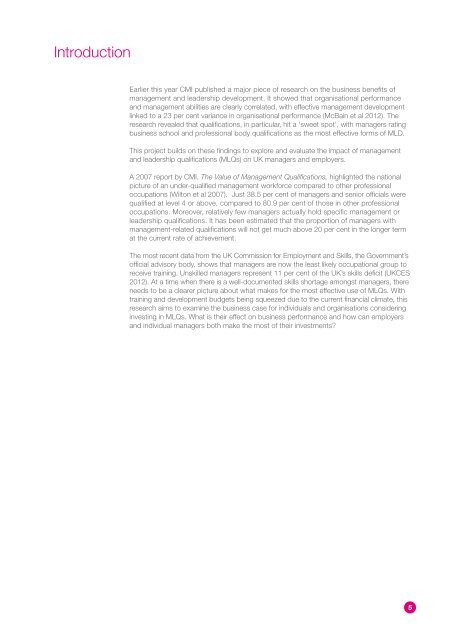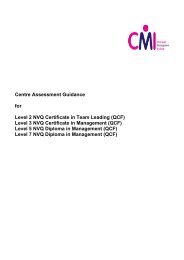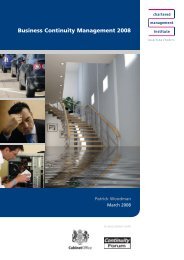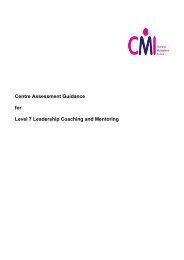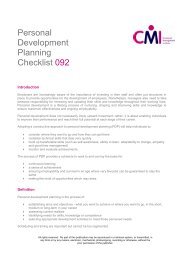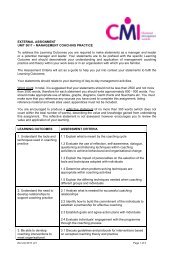The Value of Management and Leadership Qualifications
The Value of Management and Leadership Qualifications
The Value of Management and Leadership Qualifications
Create successful ePaper yourself
Turn your PDF publications into a flip-book with our unique Google optimized e-Paper software.
IntroductionEarlier this year CMI published a major piece <strong>of</strong> research on the business benefits <strong>of</strong>management <strong>and</strong> leadership development. It showed that organisational performance<strong>and</strong> management abilities are clearly correlated, with effective management developmentlinked to a 23 per cent variance in organisational performance (McBain et al 2012). <strong>The</strong>research revealed that qualifications, in particular, hit a ‘sweet spot’, with managers ratingbusiness school <strong>and</strong> pr<strong>of</strong>essional body qualifications as the most effective forms <strong>of</strong> MLD.This project builds on these findings to explore <strong>and</strong> evaluate the impact <strong>of</strong> management<strong>and</strong> leadership qualifications (MLQs) on UK managers <strong>and</strong> employers.A 2007 report by CMI, <strong>The</strong> <strong>Value</strong> <strong>of</strong> <strong>Management</strong> <strong>Qualifications</strong>, highlighted the nationalpicture <strong>of</strong> an under-qualified management workforce compared to other pr<strong>of</strong>essionaloccupations (Wilton et al 2007). Just 38.5 per cent <strong>of</strong> managers <strong>and</strong> senior <strong>of</strong>ficials werequalified at level 4 or above, compared to 80.9 per cent <strong>of</strong> those in other pr<strong>of</strong>essionaloccupations. Moreover, relatively few managers actually hold specific management orleadership qualifications. It has been estimated that the proportion <strong>of</strong> managers withmanagement-related qualifications will not get much above 20 per cent in the longer termat the current rate <strong>of</strong> achievement.<strong>The</strong> most recent data from the UK Commission for Employment <strong>and</strong> Skills, the Government’s<strong>of</strong>ficial advisory body, shows that managers are now the least likely occupational group toreceive training. Unskilled managers represent 11 per cent <strong>of</strong> the UK’s skills deficit (UKCES2012). At a time when there is a well-documented skills shortage amongst managers, thereneeds to be a clearer picture about what makes for the most effective use <strong>of</strong> MLQs. Withtraining <strong>and</strong> development budgets being squeezed due to the current financial climate, thisresearch aims to examine the business case for individuals <strong>and</strong> organisations consideringinvesting in MLQs. What is their effect on business performance <strong>and</strong> how can employers<strong>and</strong> individual managers both make the most <strong>of</strong> their investments?5


